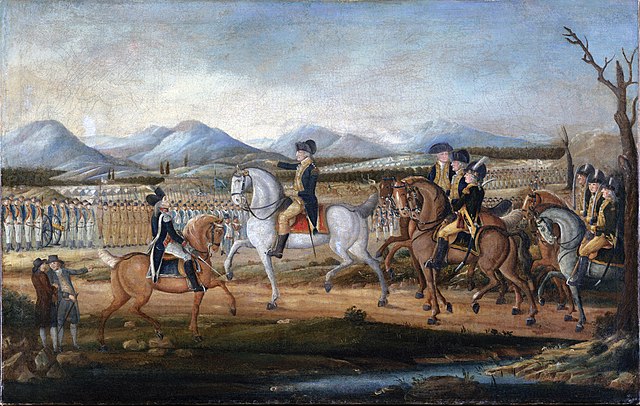William Rawle was an American lawyer from Philadelphia, who served as United States district attorney in Pennsylvania from 1791 to 1800. He founded The Rawle Law Offices in 1798 which evolved into Rawle & Henderson, the oldest law firm in the United States. He was the first chancellor of the Philadelphia bar association and published several influential legal texts including A View of the Constitution of the United States. He was the first to argue for secession in the United States.
Portrait of Rawle by Benjamin West
Engraving of Rawle in 1832
The Whiskey Rebellion was a violent tax protest in the United States beginning in 1791 and ending in 1794 during the presidency of George Washington. The so-called "whiskey tax" was the first tax imposed on a domestic product by the newly formed federal government. Beer was difficult to transport and spoiled more easily than rum and whiskey. Rum distillation in the United States had been disrupted during the American Revolutionary War, and whiskey distribution and consumption increased afterwards. The "whiskey tax" became law in 1791, and was intended to generate revenue to pay the war debt incurred during the Revolutionary War. The tax applied to all distilled spirits, but consumption of American whiskey was rapidly expanding in the late 18th century, so the excise became widely known as a "whiskey tax". Farmers of the western frontier were accustomed to distilling their surplus rye, barley, wheat, corn, or fermented grain mixtures to make whiskey. These farmers resisted the tax. In these regions, whiskey often served as a medium of exchange. Many of the resisters were war veterans who believed that they were fighting for the principles of the American Revolution, in particular against taxation without local representation, while the federal government maintained that the taxes were the legal expression of Congressional taxation powers.

George Washington reviews the troops near Fort Cumberland, Maryland, before their march to suppress the Whiskey Rebellion in western Pennsylvania.
Alexander Hamilton in a 1792 portrait by John Trumbull
"Famous Whiskey Insurrection in Pennsylvania", an 1880 illustration of a tarred and feathered tax collector being made to ride the rail
In his 1796 book, Congressman William Findley argued that Alexander Hamilton had deliberately provoked the Whiskey Rebellion.






